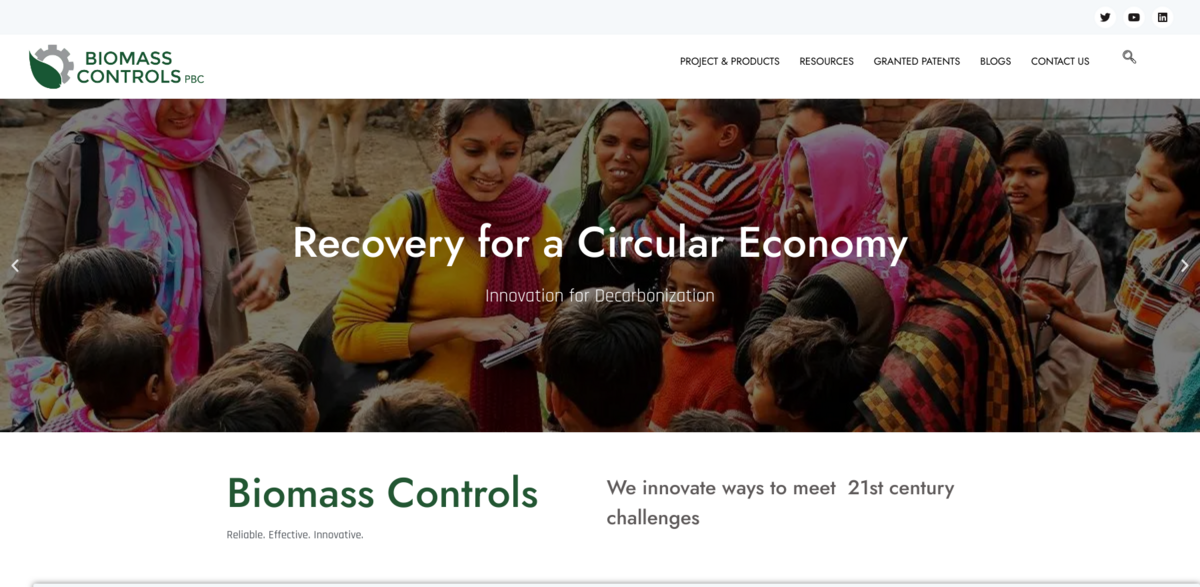What is the Project?
Biomass Controls is a mission-driven project focused on offering control technologies and innovations that enable the rapid refinement of sanitation, agricultural, and food outputs. The core vision is to become a world leader in decentralized, community scale thermal solutions that significantly impact climate, quality of life, and gender equality in served areas. The project’s roots stretch back to 2015 in Connecticut, where Biomass Controls PBC was founded as part of the Bill & Melinda Gates Foundation Reinvent Toilet Challenge. Over time, this initiative has grown into an engaging movement that brings together technology and environmental stewardship to transform waste into valuable resources. This is done by harnessing human-centered innovation to treat pathogens, reduce greenhouse gasses, sequester carbon, and ultimately improve soil health… all while supporting communities in creative ways.
Main Benefit
The project delivers multiple key benefits by integrating cutting-edge technology with sustainable practices. Some of the standout figures and facts include:
- Decentralized rapid nutrient recovery and treatment for green resources including manure, textiles, food, and excreta.
- Extensive use of thermochemical treatment via the Biogenic Refinery for high moisture materials such as manures, human excreta, agriculture residues, and food waste.
- A series of patents designed not only to protect the environment but also to return valuable nutrients to the soil.
- An impressive track record with accelerator programs in India, an involvement in the Toilet Board Coalition Accelerator in 2018, and the Manure Challenge Accelerator program in 2019 geared towards hog and dairy cow manure processing.
- Participation in the Launch Alaska Accelerator program (2020-2021), showcasing its capability in cold climate applications for safe disposal of human and food waste.
Innovative Technologies and Process Design
At the heart of this initiative is technology adoption support and thoughtful design that consistently delivers measurable impact. Biomass Controls stands out by providing a holistic array of services, including design, technology adoption support, and precise impact measurement. The project uses a well-thought-out approach that integrates decentralized solutions in real-world applications. The incorporation of thermochemical techniques not only refines waste but also transforms it into energy, reusable water, and biochar. This blend of technology and sustainability is designed to foster a cleaner, more resource-efficient future. The natural flow in operations and creative engineering truly makes the project feel like a breath of fresh air in the fields of sanitation, agriculture, and environmental remediation.
Community-Centered Decentralization
The decentralized framework of the project puts significant power into the hands of local communities, enabling them to manage and convert waste within their own settings. Biomass Controls’ commitment to community-scale thermal solutions means that areas served by these technologies can experience improved sanitation, better health outcomes, and enhanced local economies. By promoting rapid nutrient recovery within the community framework, the project creates a ripple effect that enhances environmental quality, adds value to discarded materials, and supports sustainable practices at the grassroots level. This approach is not just about technology—it’s about nurturing a shared responsibility towards a healthier planet.
Environmental Impact and Sustainability
The project’s activities are closely tied to robust environmental benefits. With its focus on protecting the environment and returning nutrients to the soil, Biomass Controls leverages innovative patents and refinements that help combat some of the most pressing ecological challenges. By transforming waste materials, the initiative is instrumental in reducing greenhouse gasses and sequestering carbon, which is crucial in the fight against climate change. This sustainable methodology has proven effective in tackling water and sanitation challenges globally, and it demonstrates that with determined innovation, even difficult problems can have sustainable solutions.
Project Impact
- Climate Action – Through processes that sequester carbon and reduce greenhouse gas emissions.
- Good Health and Well-Being – By ensuring safe disposal and treatment of waste, thus improving sanitation and community health.
- Clean Water and Sanitation – Providing rapid refinement of sanitation outputs that treat pathogens effectively.
- Affordable and Clean Energy – Generating energy from waste streams that might otherwise go unused.
- Sustainable Cities and Communities – Empowering communities with decentralized, scalable thermal solutions.
- Responsible Consumption and Production – Turning waste into a valuable resource and supporting nutrient cycling.
Future Directions and Vision
Looking ahead, the project envisions a future where the Carbon Circular Sanitation Economy becomes a reality. By continuing to implement human-centered innovations, the approach not only sustains but actively enhances the ecosystem by transforming waste streams into resources that fuel energy, produce reusable water, and generate biochar. This forward-thinking outlook embraces not just the technological challenges but also the socio-economic aspects of global sanitation and agricultural practices. There is an underlying momentum that propels the project forward into new accelerator programs and innovative partnerships across different regions. The engaging nature of the work, coupled with groundbreaking refinements and a commitment to community-scale impact, makes the journey an evolving narrative—one that inspires additional breakthroughs and fosters lasting benefits for communities around the globe. The creative blend of science and empathy drives the mission forward, ensuring that the vision of advanced control technologies becomes a tangible force for a sustainable and inclusive future.






















